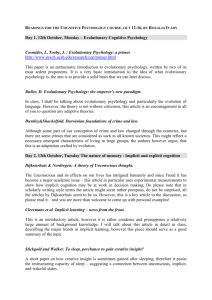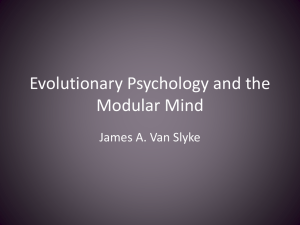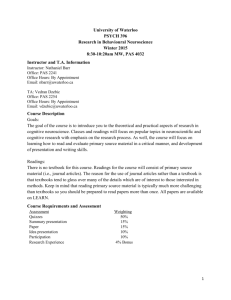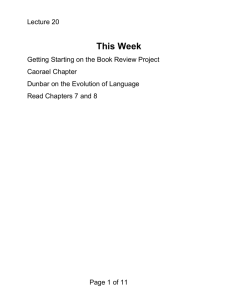Cognitive Social Psychology
advertisement
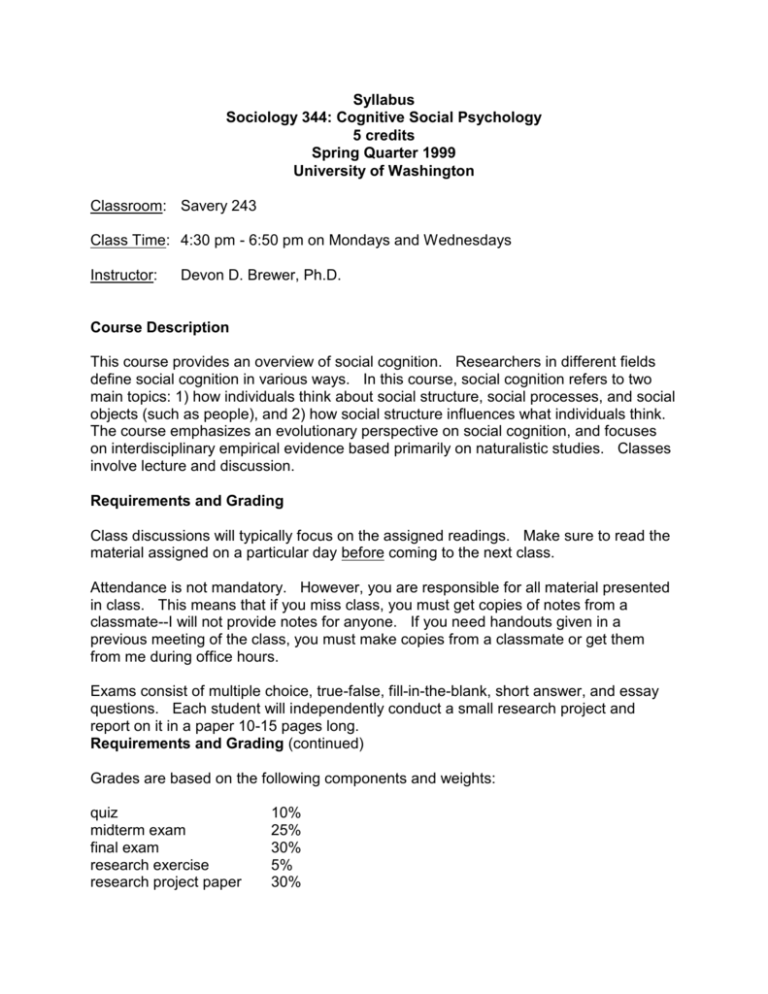
Syllabus Sociology 344: Cognitive Social Psychology 5 credits Spring Quarter 1999 University of Washington Classroom: Savery 243 Class Time: 4:30 pm - 6:50 pm on Mondays and Wednesdays Instructor: Devon D. Brewer, Ph.D. Course Description This course provides an overview of social cognition. Researchers in different fields define social cognition in various ways. In this course, social cognition refers to two main topics: 1) how individuals think about social structure, social processes, and social objects (such as people), and 2) how social structure influences what individuals think. The course emphasizes an evolutionary perspective on social cognition, and focuses on interdisciplinary empirical evidence based primarily on naturalistic studies. Classes involve lecture and discussion. Requirements and Grading Class discussions will typically focus on the assigned readings. Make sure to read the material assigned on a particular day before coming to the next class. Attendance is not mandatory. However, you are responsible for all material presented in class. This means that if you miss class, you must get copies of notes from a classmate--I will not provide notes for anyone. If you need handouts given in a previous meeting of the class, you must make copies from a classmate or get them from me during office hours. Exams consist of multiple choice, true-false, fill-in-the-blank, short answer, and essay questions. Each student will independently conduct a small research project and report on it in a paper 10-15 pages long. Requirements and Grading (continued) Grades are based on the following components and weights: quiz midterm exam final exam research exercise research project paper 10% 25% 30% 5% 30% Students can earn up to 15% additional points by completing several short extra credit assignments and participating in class discussions. Policies In this course, we sometimes will touch on controversial topics (such as sex differences and evolution). In class discussions, all students are expected to respect each other’s right to an opinion. I will guide discussions to make sure that we move forward and cover the appropriate material. Cheating and plagiarism (passing off someone else’s writing as your own) each will result in failing the class. Make-up exams will only be given to those who make special arrangements in advance or who have medical excuses or personal catastrophes that are documented. If you disagree with the score given to your answer on an exam question or an assignment and wish to challenge it, you may submit an appeal to me. The written appeal should be a paragraph that explains why you think you are correct and cites supporting materials presented in class or the readings. Late research exercises and project papers will be penalized. Readings A packet of course readings (see next page for list) is available for purchase at Professional Copy ‘N Print on the Ave (4200 University Way N.E.; tel. 634-2689; hours: 7 am - 12 midnight). Some of these readings are also on reserve at the Odegaard Undergraduate Library (OUGL). There is no textbook for this course. Readings (continued) Dietrich, Bill. The boundaries between science and religion. Seattle Times, April 23, 1996. Buss, David. (1999). Evolutionary psychology: The new science of the mind. Boston: Allyn and Bacon. (chapters 1, 4, & 5: “The scientific movements leading to evolutionary psychology,” “Women’s long-term mating strategies,” and “Men’s long-term mating strategies”) Cosmides L, & Tooby J. (1998). Evolutionary psychology: A primer. Unpublished manuscript, Center for Evolutionary Psychology, University of California, Santa Barbara (available at http://www.psych.ucsb.edu/research/cep/primer.htm). Ellis, Bruce J., & Symons, Donald. (1990). Sex differences in sexual fantasy: An evolutionary psychological approach. Journal of Sex Research, 27, 527-555. Cheney, Dorothy L., & Seyfarth, Robert M. (1990). How monkeys see the world. Chicago: University of Chicago Press. (chapter 3, “Social knowledge”) Byrne, Richard W. & Whiten, Andrew. (1988). Machiavellian intelligence: Social expertise and the evolution of intellect in monkeys, apes, and humans. Oxford: Clarendon Press. chapters 2, 7, & 8: “The social function of intellect” by Nicholas K. Humphrey “The cognitive demands of children’s social interaction with peers” by Peter K. Smith “Mapping social concepts in monkeys” by Verena Dasser Krebs, Dennis L., & Denton, Kathy. (1997). Social illusions and self-deception: The evolution of biases in person perception. In Jeffry A. Simpson & Douglas T. Kenrick (Eds.), Evolutionary social psychology, Mahwah, NJ: Lawrence Erlbaum Associates, pp. 21-47. Daly, Martin, Salmon, Catherine, & Wilson, Margo. (1997). Kinship: The conceptual hole in psychological studies of social cognition and close relationships. In Jeffry A. Simpson & Douglas T. Kenrick (Eds.), Evolutionary social psychology, Mahwah, NJ: Lawrence Erlbaum Associates, pp. 265-296. Freeman, Linton C., Freeman, Sue C., & Michaelson, A. G. (1988). On human social intelligence. Journal of Social and Biological Structures, 11, 415-425. Freeman, Linton C. (1992). Filling in the blanks: A theory of cognitive categories and the structure of social affiliation. Social Psychology Quarterly, 55, 118-127. Readings (continued) Brewer, Devon D. (1995). The social structural basis of the organization of persons in memory. Human Nature, 6, 379-403. Freeman, Linton C., Romney, A. Kimball, & Freeman, Sue C. (1987). Cognitive structure and informant accuracy. American Anthropologist, 89, 310-325. White, Geoffrey M. (1980). Conceptual universals in interpersonal language. American Anthropologist, 82, 759-781. Weekly Schedule Week 1 Monday, March 29 Introduction Basic social science concepts Read: Dietrich; Buss ch. 1 Wednesday, March 31 Evolutionary concepts and theory Read: Cosmides & Tooby, pp. 1-24 Week 2 Monday, April 5 Evolutionary concepts and theory Read: Humphrey; Cosmides & Tooby, pp. 24-32 Wednesday, April 7 Adaptations to social problems Machiavellian intelligence Social context for reasoning Read: Buss ch. 4 & 5 Week 3 Monday, April 12 Mating and sex Read: Ellis & Symons Wednesday, April 14 Quiz Mating and sex continued Assigned: research project paper Read: Smith Week 4 Monday, April 19 Recognizing individuals Dominance Assigned: research exercise Read: Cheney & Seyfarth Wednesday, April 21 Dominance continued Read: Dasser Week 5 Monday, April 26 Midterm exam Affiliation Read: Krebs & Denton; Freeman, Freeman, & Michaelson Wednesday, April 28 Affiliation continued Read: Daly, Salmon, & Wilson; Freeman (1992) Week 6 Monday, May 3 Affiliation continued Due: research exercise Due: research project plan No reading assigned Wednesday, May 5 Other social relations, roles last day to turn in first 3 extra credit reports Read: Brewer Week 7 Monday, May 10 Recalling individuals Read: Freeman, Romney, & Freeman Wednesday, May 12 Recalling individuals continued Read: White Week 8 Monday, May 17 Personality and other individual characteristics Wednesday, May 19 Personality and other individual characteristics cont. Week 9 Monday, May 24 Social structural influences on cognition Wednesday, May 26 Social structural influences on cognition continued review for final exam Week 10 Monday, May 31 Holiday - no class Wednesday, June 2 Final exam last day to turn in final 2 extra credit reports Due: research project papers
